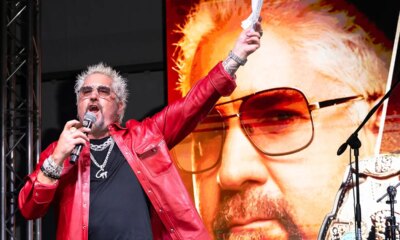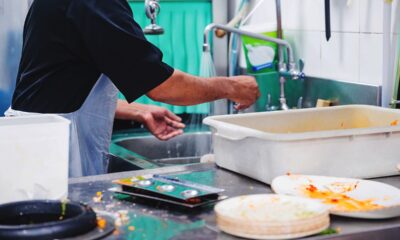San Diego, CA
Slightly Stoopid Frontman Buys Iconic Bar Where He Grew Up | San Diego Magazine

OB is weird. And locals like it that way. Change doesn’t come easily to the beach town that prides itself on offbeat as the norm and counterculture as the status quo. So when the former owner of The Harp Anthony “Tony” Fleming passed suddenly last October, the fate of the beloved Irish pub seemed murky.
Would it get snapped up by outside investors? Would it change the vibe of Newport Avenue? Would it turn into another quirky bar with moody bronze light fixtures, explosively kitschy patterned wallpaper, and ironically named $25 cocktails?
As of today, OBceians can rest easy. The Harp now officially has four new owners—all locals, all familiar faces.
Miles Doughty (fourth from L) and Slightly Stoopid
Miles Doughty is the frontman and lead singer of Slightly Stoopid, an Ocean Beach-based reggae-rock band that Doughty started with Kyle McDonald and Adam Bausch in 1994. Jeremy Diem is the current president and CEO of Hodad’s, the OG best burger in SD. Tyson Green and Steve Ashton are longtime best friends and regular fixtures behind Ocean Beach bars like Mother’s Saloon (R.I.P.), Sunshine Company Saloon, and Aquarius Bar & Grille.
The four friends initially banded together in order to get into the hospitality business, hoping to purchase Cheswick’s West on Newport Avenue. Negotiations didn’t pan out, and when Fleming passed away, Green says the opportunity to buy The Harp instead felt like fate.
“Things happen for a reason, and that was a blessing,” he says, explaining that a larger space with a kitchen and live music element better fit the group’s vision. Doughty agrees, adding that he hopes to leverage his music industry experience to bring more bands and live music to The Harp. It’s all their first experience with ownership, but none of them are worried.

“It’s cool to be able to do it with your friends that have been in the bar business for 25-years plus,” says Doughty. Green agrees, fully confident in the assembled team. “I have no fear,” he laughs. “It’s an amazing feeling to know we’re going to kill it and that’s just the way it’s going to be.”
Doughty is the only born-and-raised OB local, but everyone has roots in the beach town that go back decades and intend to keep the spirit of The Harp and Ocean Beach as it has been. However, Doughty adds, they do plan to eventually renovate and rebrand the space once they have a few months of summer service under their belts. But he assures me that everyone will still be welcome at the all-ages space with plenty of good music, food, and family fun.
Open today, the new owners are taking on what has historically been The Harp’s busiest weekend—St. Patrick’s Day as their first official debut. “We’re going to throw ourselves to the wolves and let it rip,” laughs Green. “We’re super fired up—OB’s in for some cool shit.”

San Diego Restaurant News & Food Events
San Diego Celebrates St. Patrick’s Day This Weekend
Corned beef is a great way to sop up Guinness and Jameson, and there will be plenty of all three across San Diego this weekend. Pacific Beach’s Duck Dive is serving a corned beef egg and hash breakfast special and traditional corned beef hash for dinner Friday, Saturday, and Sunday. North Park Beer Company’s Bankers Hill location is running a couple Irish food specials (plus plenty of beer, duh) on Saturday and Sunday.
On Sunday, The Smoking Gun in Gaslamp is slinging corned beef tacos, Barleymash will have a Reuben sandwich special (plus plenty of Irish-inspired cocktails and green beer), and The Lion’s Share will host an “Irish Goodbye” pop-up menu of Irish bites and cocktails from Ian Ward (bar manager at Addison).
Beth’s Bites
It’s the South Park Spring Walkabout this Saturday from 5 p.m. – 9 p.m., and there are like, a bajillion amazing places to stop, shop, sip, and savor. If you’re not sure where to start, The Rose just released a handful of new spring cocktails, so that seems as good a place as any.
A new Mexican restaurant coming to Little Italy? Sign me up.
I finally stopped by Shawarma Guys’ new brick and mortar location in La Mesa to get their lemon cream chop fries and a Wagyu beef shawarma cheesesteak. Both excellent, although I think the cheesesteak could have been a little bigger. (Am I challenging myself to a Shawarma Guys x Giorgino’s cheesesteak-off??)

San Diego, CA
Joan Endres – San Diego Union-Tribune

Joan Endres
OBITUARY
Born January 1939 in Cincinnati Ohio. Died February 14, 2026, in San Diego, California, with her sons at her side. Her beloved husband Dean passed away in 2010.
Joan was the only child of Thomas and Edna Palmer. In 1943, the family moved to San Diego, where Joan graduated from Helix High School in 1956.
In 1957 Joan married Dean Endres of San Diego, where they raised two sons. Joan followed her two great passions outside the home, the Arts, and Gardening. Both activities being a way to bring beauty to others and to the community.
Joan received a degree in Environmental Design from San Diego State University, and afterwords worked at UCSD, for the Campus Architect.
As an artist, Joan worked in various media, especially ceramics. She was active in many cultural and arts organizations, eventually becoming President of the Combined Organization for the Visual Arts (COVA). Later she turned to gardening, with the Water Conservation Garden at Cuyamaca Community College and the Master Gardener Association of San Diego County.
Joan is survived by her son Jeff and wife Katrin, grandson Jackson, and son Todd Endres, all of La Mesa, and sisters Alice Buck of Phoenix, Elaine Kennedy of San Diego, Nancy and husband Don Jones of Vista, Eva Budzinski of Cloudcroft, New Mexico, and their children and grandchildren.
There will be a Celebration of Life for Joan in the near future. Those who wish to attend should contact celebratejoanuvart@gmail.com to receive details when they are confirmed. In lieu of flowers, the family respectfully suggests a donation to the Water Conservation Garden or the Diego Visual Arts Network (SDVAN).
San Diego, CA
San Diego State moves back into NCAA Tournament field in latest ESPN Bracketology

The San Diego State Aztecs’ have moved off the bubble and back into the NCAA Tournament’s Field of 64 in the latest ESPN’s Bracketology projections.
The Aztecs must feel like a yo-yo, but now it’s in a good way. Bracket expert Joe Lunardi moved them from the bottom of the First Four Out — No. 72 — to holding the Mountain West’s automatic bid after an 89-72 home romp Wednesday night over Utah State, which had held the auto-bid in bracketology for a few weeks now.
Lunardi now has the Aztecs as the No. 11 seed in the West Region, with a projected first-round date against former MW rival BYU in Portland.
Lunardi wrote that SDSU’s auto-bid “shifts the entire bubble.”
Wednesday night’s victory not only pulled the Aztecs (19-8, 13-4) into a tie with Utah State (23-5, 13-4) atop the MW standings, but it was just their second Quad 1 victory in six such opportunities.
SDSU’s next two games are both Quad 1 chances, at New Mexico on Saturday and then at Boise State on Tuesday night.
The win lifted the Aztecs only one spot in the NCAA NET Rankings, to No. 43. Those rankings are used by the NCAA Tournament Selection Committee as the primary sorting tool for selection and seeding for March Madness.
SDSU’s resume for earning an at-large berth has been on shaky ground all season, and was seriously damaged last week when the Aztecs lost at home to Grand Canyon and were then routed at Colorado State, both Quad 2 games.
SDSU’s best bet to assure a trip to March Madness for the sixth straight season is to win the MW tournament in Las Vegas and claim the automatic bid. That requires winning three games in as many days, and perhaps a third showdown against the Aggies, who beat the Aztecs 71-66 in Logan on Jan. 31.
Lunardi now has Utah State projected as an at-large team, but still with the No. 7 seed in the East, facing No. 10 Texas A&M in a first-round game in St. Louis.
New Mexico (21-7, 12-5), lurking just a game behind SDSU and USU, has dropped from the Last Four In at No. 68 to the First Four Out at No. 70.
The Aztecs were the unanimous preseason pick to win the MW regular-season title in their final season in the league before moving into the Pac-12 along with Utah State, Boise State, Fresno State and Colorado State.
Saturday’s game at New Mexico is set to tip off at 11 a.m. PT and will air on CBS.
San Diego, CA
Oregon State Dismantles San Diego 83-49

The top teams in the West Coast Conference are jockeying for position in the standings as the regular season draws to a close, and the Oregon State women took care of business Thursday night, blowing out the San Diego Toreros 83-49 to move to 21-9 on the season, and 13-4 in conference play.
Oregon State’s Tiara Bolden Grabs WCC Honor After 44 Points Over Two Games
The Toreros have been a basement dweller in the conference for the last few seasons, so this result isn’t surprising, though it’s magnitude is a bit eye-raising. The Beavers wasted no time putting San Diego into a hole, opening the first quarter on an 8-0 run that Tiara Bolden and Kennedie Shuler getting involved early. Oregon State held a 14 point, 26-12 lead after one.
The second quarter wasn’t as lopsided, but San Diego wasn’t able to make much headway into the Beaver lead. Six points from Olivia Owens kept San Diego within shooting distance, but defensive pressure from Kennedie Shuler and strong rebounding from Lizzy Williamson kept the Toreros under control. Oregon State ended the first half up by 13, 40-27.
Oregon State Dominates Cougars in 79-51 Blowout
Oregon State tightened their grip in the third. While Olivia Owens and Kylie Ray managed to give the Toreros some hope early in the quarter, Oregon State went on a run late in the period to get their lead to 21 at the highest. San Diego finally snapped the Beaver hot streak, but a three from Kennedie Shuler ended the quarter in a 61-43, 18 point Beaver lead.
The bottom seemed to fall out of San Diego in the fourth, with the Toreros only putting six points on the board. Tiara Bolden and Kennedie Shuler kept the points flowing for the Beavers, while Lizzy Willilamson continued to dominate the boards. A layup with an and one from Elisa Mehyar were the last Beaver points of the game, giving Oregon State a 34 point, 83-49 win.
Oregon State Takes Down Portland 64-54 in Season Saving Game
It was a good night for several Beavers, with Kennedie Shuler once again leading the team in scoring. She finished the night with 22 points, four rebounds, three assists, two blocks and two steals. She can do just about everything on the court.
Tiara Bolden continued her hot streak with a 17 point night, along with four rebounds and four assists. Jenna Villa added 14 points, one rebound and one assist. Lizzy Williamson added another double double to her resume, with 10 points and 12 rebounds.
Oregon State’s Winning Streak Ends With 55-51 Loss to LMU
There’s one last item on the agenda for Oregon State, a season-closing meeting with the Loyola Marymount Lions Saturday at Gill Coliseum. The Lions handed Oregon State their first WCC loss of the season back in January, so getting some revenge before the conference tournament would be a good statement from the team. Tip off is set for 1 PM PT.
-

 World2 days ago
World2 days agoExclusive: DeepSeek withholds latest AI model from US chipmakers including Nvidia, sources say
-

 Massachusetts3 days ago
Massachusetts3 days agoMother and daughter injured in Taunton house explosion
-

 Montana1 week ago
Montana1 week ago2026 MHSA Montana Wrestling State Championship Brackets And Results – FloWrestling
-

 Louisiana5 days ago
Louisiana5 days agoWildfire near Gum Swamp Road in Livingston Parish now under control; more than 200 acres burned
-

 Denver, CO3 days ago
Denver, CO3 days ago10 acres charred, 5 injured in Thornton grass fire, evacuation orders lifted
-

 Technology7 days ago
Technology7 days agoYouTube TV billing scam emails are hitting inboxes
-

 Technology7 days ago
Technology7 days agoStellantis is in a crisis of its own making
-

 Politics7 days ago
Politics7 days agoOpenAI didn’t contact police despite employees flagging mass shooter’s concerning chatbot interactions: REPORT

























